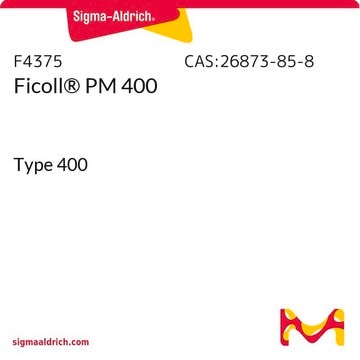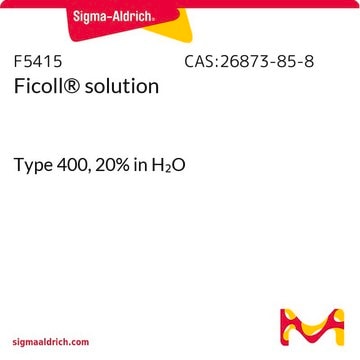GE17-1440-02
Ficoll® Paque Plus
Cytiva 17-1440-02, pack of 6 × 100 mL
Synonym(s):
Ficoll density gradient medium, cell culture media
About This Item
Recommended Products
form
liquid
packaging
pack of 6 × 100 mL
manufacturer/tradename
Cytiva 17-1440-02
color
Colorless to slightly yellow
pH range
5.5-7.5
General description
Ficoll-Paque PLUS is a ready to use, sterile medium for isolation of lymphocytes in high yield from peripheral blood using a simple and rapid centrifugation procedure. It maintains the viability and a representative distribution of B and T lymphocytes.
Application
Features and Benefits
- Ready to use sterile medium for isolation of human lymphocytes in high yield from peripheral blood.
- Maintains viability and representative distribution of B and T lymphocytes.
- Low levels of endotoxin (< 0.12 EU/mL).
Storage and Stability
Analysis Note
Legal Information
Signal Word
Danger
Hazard Statements
Precautionary Statements
Hazard Classifications
Flam. Liq. 2
Storage Class Code
3 - Flammable liquids
WGK
WGK 3
Choose from one of the most recent versions:
Certificates of Analysis (COA)
Sorry, we don't have COAs for this product available online at this time.
If you need assistance, please contact Customer Support.
Already Own This Product?
Find documentation for the products that you have recently purchased in the Document Library.
Customers Also Viewed
Articles
The effects of the mononuclear cell separation method described by Bøyum procedure are noted below, since research situations may arise in which they are significant.
The effects of the mononuclear cell separation method described by Bøyum procedure are noted below, since research situations may arise in which they are significant.
The effects of the mononuclear cell separation method described by Bøyum procedure are noted below, since research situations may arise in which they are significant.
The effects of the mononuclear cell separation method described by Bøyum procedure are noted below, since research situations may arise in which they are significant.
Protocols
Ficoll 400® is a non-ionic polymer with high hydrophilicity and water solubility, suitable for various biological applications.
Ficoll 400® is a non-ionic polymer with high hydrophilicity and water solubility, suitable for various biological applications.
Ficoll 400® is a non-ionic polymer with high hydrophilicity and water solubility, suitable for various biological applications.
Ficoll 400® is a non-ionic polymer with high hydrophilicity and water solubility, suitable for various biological applications.
Our team of scientists has experience in all areas of research including Life Science, Material Science, Chemical Synthesis, Chromatography, Analytical and many others.
Contact Technical Service















